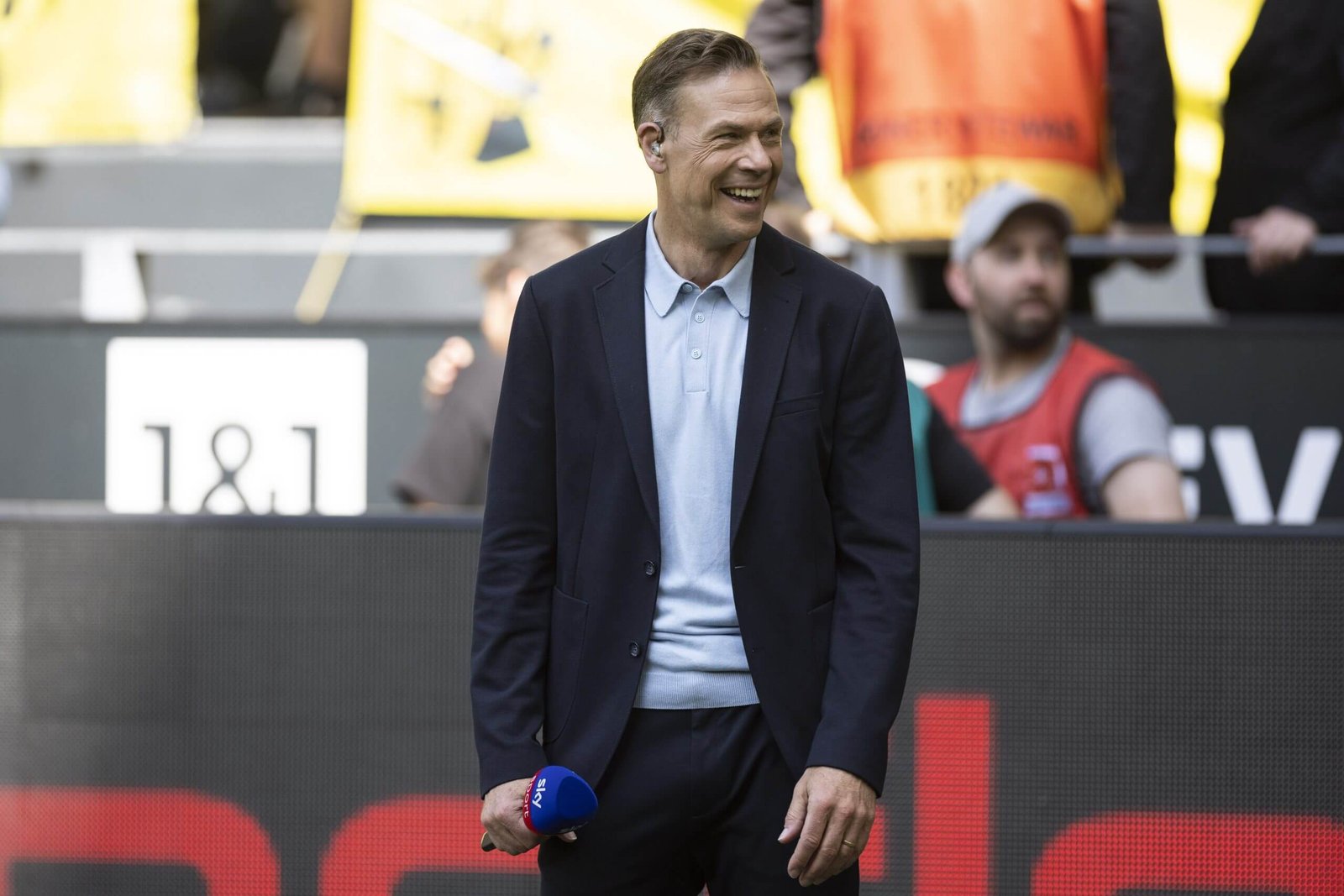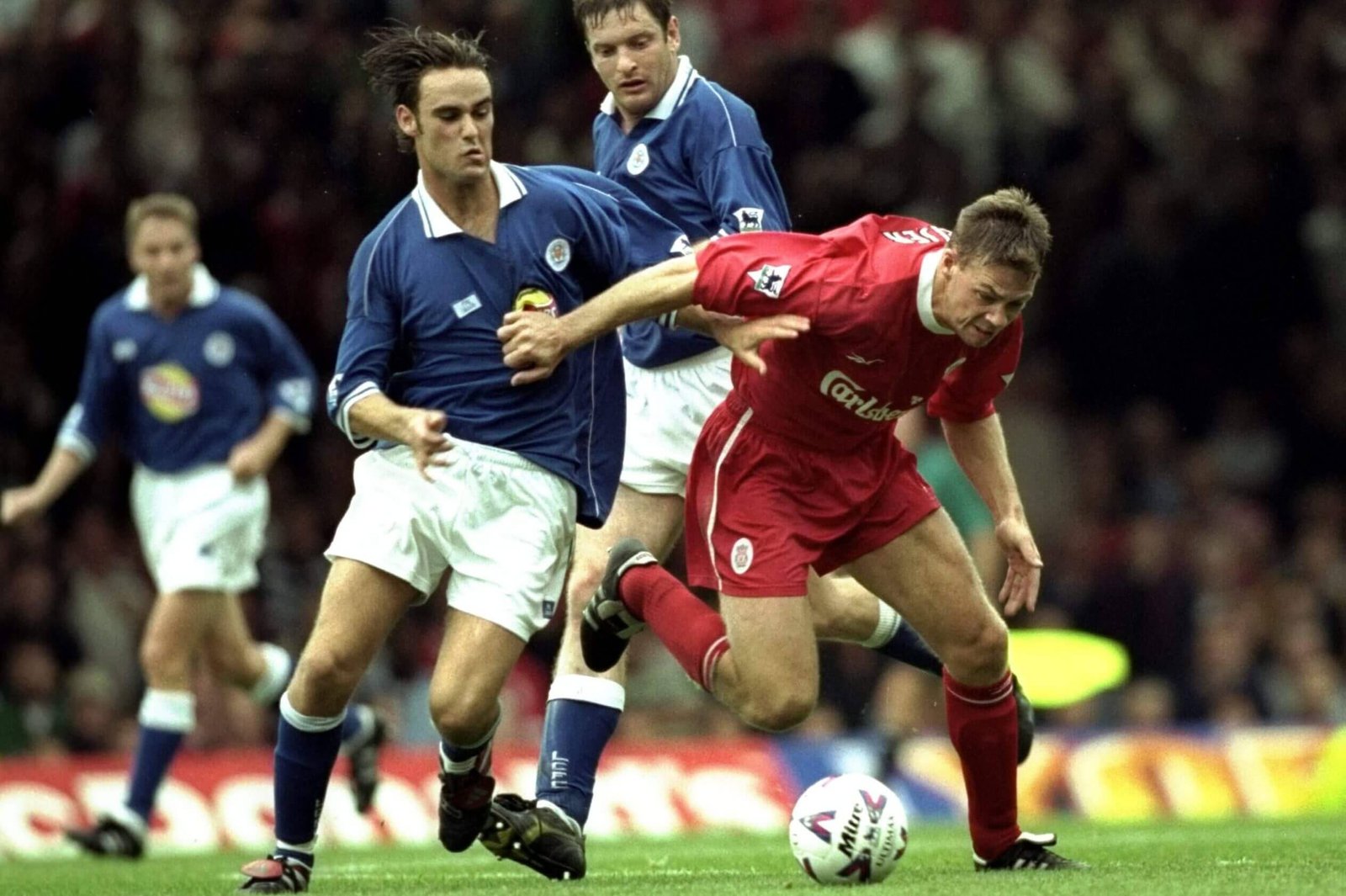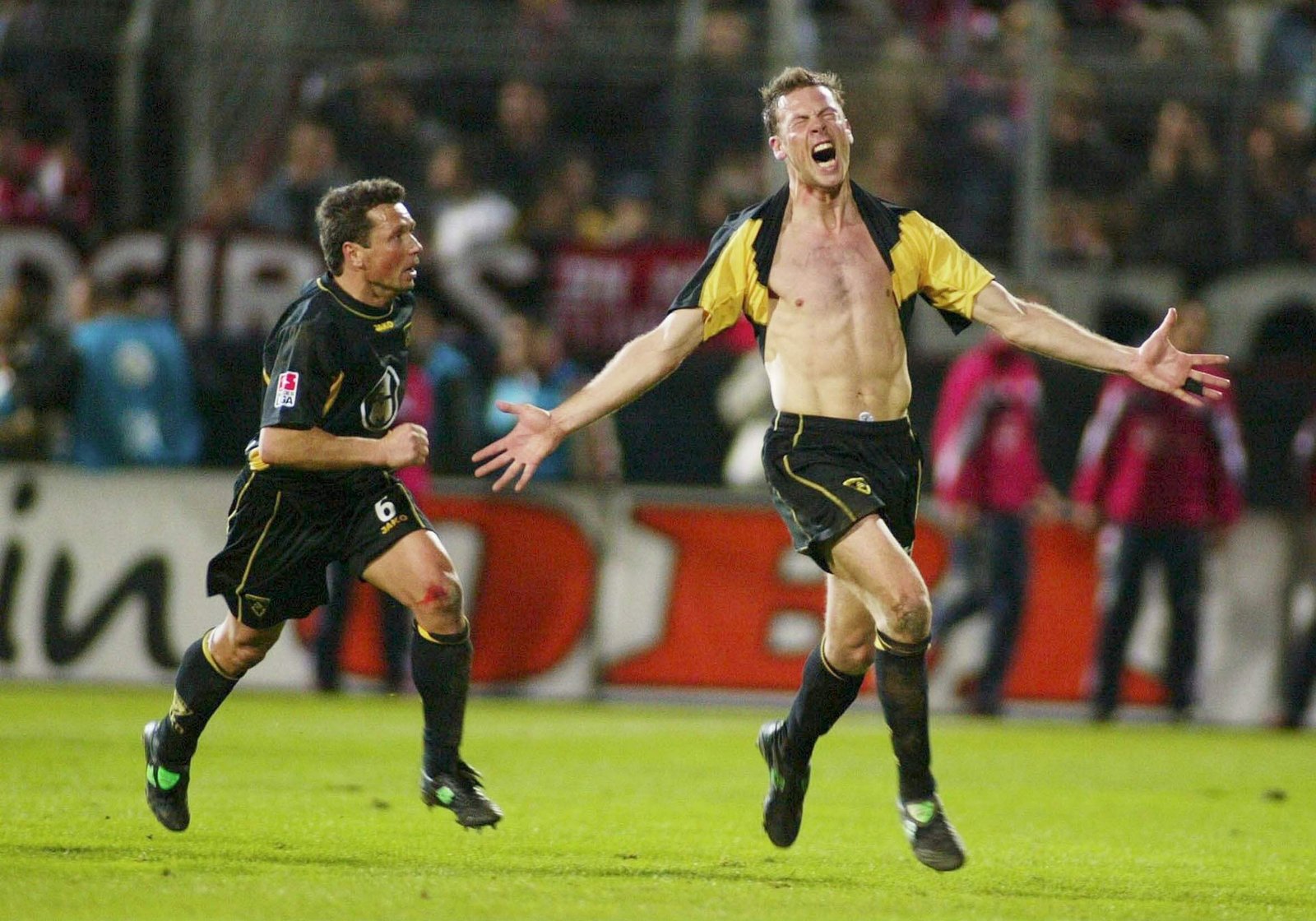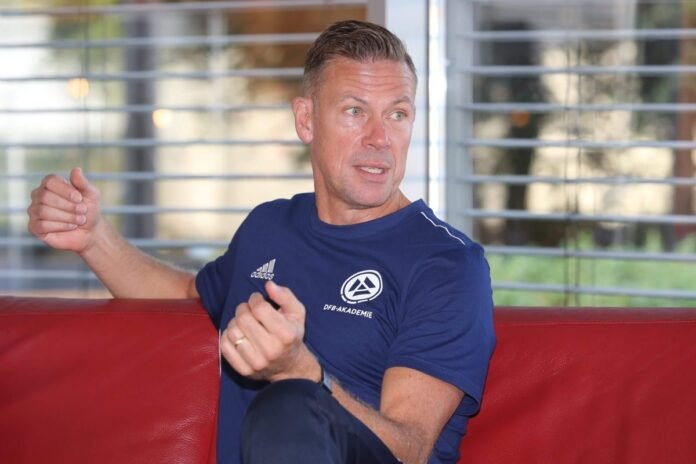There is a steady stream of Liverpool fans waiting to have a photo taken with the man they affectionately refer to as ‘Mad Erik’.
A quarter of a century has passed since Erik Meijer joined the club on a free transfer from Bayer Leverkusen and his stay proved to be brief: just 27 appearances and two goals later he returned to Germany to sign for Hamburg. But, as the queue of supporters waiting to see him at Hotel Anfield before the recent Champions League tie between Liverpool and Leverkusen proved, he left a lasting impression.
“It gives me a great feeling,” says Meijer, whose larger-than-life personality and unwavering commitment earned him cult-hero status on the Kop. “I wasn’t at Liverpool for long. I was only such a small piece of the story, I didn’t win big prizes here, but once you play for Liverpool, the people recognise and appreciate you forever.
“Scousers love players who work their b******* off. I wasn’t the most talented but I would always run and run until the tank was empty. They could see what playing for Liverpool meant to me and I’ll always be a fan of this club.”
Erik Meijer on his trip back to Anfield for the Bayer Leverkusen game (Courtesy of Erik Meijer)
Now 55, Meijer is based in the Dutch city of Maastricht and has carved out a successful career as a pundit for Sky Germany. Each Saturday he drives across the border to fly from Dusseldorf to Munich to be part of their Bundesliga coverage alongside his former Liverpool team-mate Dietmar Hamann.
“The first question I had was, ‘There are 80 million Germans in this country so why do they need to employ a Dutchman?’” he laughs. “But they wanted a different voice — someone who would say that Bayern Munich were c**p when they were.”
There is a sense of pride that fellow Dutchman Arne Slot has made such a remarkable impact at Anfield since taking over from Jurgen Klopp. Liverpool are five points clear at the top of the Premier League and boast the only 100-per cent record in the Champions League.
Meijer was sat in the Anfield Road Stand to watch the second-half demolition of Xabi Alonso’s Leverkusen.
“It was so impressive,” he says. “The analysis of Arne and his staff is so good. They keep on making clever tactical changes in terms of the system or the personnel so the second half of a game is much better than the first half. They find weaknesses to exploit and there always seems to be a reaction.
“The Arne I see at Liverpool is the same one I saw at Cambuur, AZ and Feyenoord. So calm and measured. The only thing that’s changed is the quality of the players he’s working with.
“It was such a clever choice by Liverpool because Feyenoord played a similar type of football to Liverpool. It hasn’t been a big adaptation for the players. There’s just a bit more structure and patience with the ball. They look so much more secure defensively. Sometimes it’s good for players to hear new ideas and new voices.”

Meijer is now a popular pundit on Sky in Germany (Marco Steinbrenner/DeFodi Images via Getty Images)
The transformation in midfielder Ryan Gravenberch, who was a bit-part player under Klopp, is arguably the best example of Slot’s ability to get more out of the squad he inherited.
“Ryan just needed a hand on the shoulder,” Meijer says. “He didn’t get the chance to show what he could do at Bayern Munich. He moved there too young. Then he was in and out of the Liverpool team last season.
“But Arne knew what he was capable of. At Ajax, he was viewed as the new Frank Rijkaard — the kind of player who seemed to go from the defensive box to the attacking box in four steps. This season Ryan has grown as a person and player. He’s now one of the first names on the team sheet for the national team as well.”
The son of a butcher, Meijer had to make a choice as a teenager between going into the family business or following his dream of becoming a professional footballer in the Netherlands.
“My father always sent me to the football pitch next door,” he says. “It’s what he had wanted for himself but he didn’t quite make it and just played amateur. I grew to 1.9m and kept scoring goals.”
After making the breakthrough at Fortuna Sittard, he had spells at Royal Antwerp and MVV Maastricht before landing a big move to PSV Eindhoven in 1993. The following year their strikeforce was further bolstered by the arrival of a 17-year-old Brazilian named Ronaldo.
“I remember the first day he arrived at training. This tiny guy with big teeth,” he recalls. “We didn’t know anything about him. It was warm, we were all in shorts and T-shirts, but he had a full tracksuit on. As soon as he got the ball it was like, ‘Wow, what is this?’ It was like an explosion.
“His movements were unbelievable and he was such an ice-cold finisher. He scored 30 (league) goals in his first season. We had never seen anything like it.”
Meijer was playing for Bayer Leverkusen towards the end of the 1998-99 season when a call came from then Liverpool manager Gerard Houllier, who wanted to sign him as a free agent when his contract expired that summer. A meeting was arranged at Brussels Airport.
“Houllier said, ‘Erik, would you like to play for Liverpool?’ I just wanted to shout, ‘Yes!’ As a kid, Ian Rush was my hero. My father loved Liverpool, too.
“When I called my father, I hadn’t even sorted out a contract but he said, ‘Just tell them you’re coming whatever! I want to go to Anfield.’
“Walking down those steps at Anfield for the first time with You’ll Never Walk Alone in my ears, I was holding back tears.”
With Michael Owen and Robbie Fowler for competition, along with Titi Camara, who had arrived from Marseille, Meijer knew that he wouldn’t be a regular starter.
“Houllier was very clear what my role would be. I was there to make the others look better — to win balls so others could profit from it.
“There were six of us who made their debut on the same day against Sheffield Wednesday (along with Camara, Hamann, Sami Hyypia, Vladimir Smicer and Sander Westerveld). There was good camaraderie between the English and the foreign boys. I was closest to the ones who lived near me in Calderstones Park — Sami, Sander, Didi, and Rigobert Song.
“At the beginning I didn’t find it easy with Houllier. The French are different to us Dutch, who are very direct. We fit well with Scousers — dark humour, the ability to laugh at yourself. I was the type who was always swearing and shouting during training if things weren’t going the way I wanted and Houllier didn’t like that. I had to get used to Houllier. Tactically, he was very good and after a while I respected him a lot.”
His two goals for Liverpool came in a 5-1 win over Hull City in the League Cup at Boothferry Park in September 1999.
“I got them in the most beautiful city!” he chuckles. “It was a big relief to finally get off the mark. I actually played quite a lot that season (10 starts and a further 14 appearances as a substitute). Houllier surprised me by starting me against Man United at Old Trafford — the 1-1 draw when Patrik Berger smashed in a free-kick.”

Meijer was a wholehearted but limited player for Liverpool (Alex Livesey /Allsport)
It was a time when the players would still frequently socialise in the city.
“We had some great times down at the Albert Dock. It was Blue Bar and then downstairs to Baby Blue. I remember coming out about 2am with Markus Babbel and our wives. We got in a cab but then the driver ordered us to get out. He said, ‘I’m an Evertonian! I’m not driving you two anywhere’.
“There was another time when we were in Jalons Restaurant when these guys came in and started shooting. Two got shot in the leg. That was frightening and we had to give statements to the police at Melwood. It was gang-related.”
After just three substitute appearances in the early months of 2000-01, Meijer decided the time had come to move on. There was a short loan spell at Preston North End under David Moyes before he joined Hamburg on a permanent basis in December 2000.
“It was the signing of Emile Heskey (£11million from Leicester City in March 2000) that killed me,” he says. “He was bigger, quicker, younger and scoring more than I did.
“That was three England internationals ahead of me in Owen, Fowler and Heskey. They were better than me. Then you have to be honest and take a step back. I left Liverpool with pain in my heart but it was the right decision. I can say that the level of Liverpool was too high for me. That’s just the way it is.
“The one positive was that when I left I bumped into Jari Litmanen at Manchester Airport. He was signing for Liverpool from Barcelona. I told him my house was for sale and gave him my number. Two days later, he called to say he liked it and we agreed a price. His one demand was that I left the satellite dish on the wall.”
Houllier’s Liverpool famously went on to clinch a treble in 2000-01 and Meijer made the trip to Dortmund to watch their thrilling 5-4 UEFA Cup final triumph over Alaves. His memories of that night are hazy.
“Sander sorted out tickets for me and some friends,” he says. “We got there five hours before kick-off and went into the town square which was full of Alaves and Liverpool fans.
“My friends had Liverpool shirts with ‘Meijer’ on the back. I think they were the only ones Liverpool sold that season! When they went to the bar to order, the Scousers asked them why they were wearing them and they said, ‘Erik is our mate and he’s over there’. That was it!
“I had to drink litres and litres of beer. Everyone seemed to get me one. It just kept coming. It was one big party with all the singing. I just about managed to get to the match. I will never forget that day.”
Meijer moved from Hamburg to German second-tier outfit Alemannia Aachen. He helped them reach the German Cup final in 2004, qualify for the UEFA Cup and win promotion to the Bundesliga. He was nearly 37 when he retired in 2006.

Meijer celebrates scoring against Bayern Munich in Alemannia Aachen’s 2003-4 German Cup run (Vladimir Rys/Bongarts/Getty Images)
“My body was done — my heel, my knee, everything hurt,” he says. “I was getting slower and slower. I could feel the gap to the younger players getting bigger and bigger. I thought if I played in the Bundesliga at that age then everyone would laugh at me.
“I had 18 years as a professional footballer. My initial target was to have one so I have to be happy with that. It was always a well-paid hobby.
“It’s the dressing room feeling I miss the most — different nationalities and religions all wearing the same shirt and fighting for each other. You have to give something of yourself away to get something back from someone else.”
These days he combines his punditry work with playing padel and is a keen triathlete.
“It’s my way of trying to avoid getting a double chin,” he adds.
“This was my first trip back to Anfield since before the pandemic and it’s great to see the club doing so well. I’ve got no doubt that Arne and the players can sustain it. Jurgen built a very good BMW. Arne has tweaked the engine a bit here and there, and has got it purring.”
(Top photo: Christof Koepsel/Getty Images)
Read the full article here


